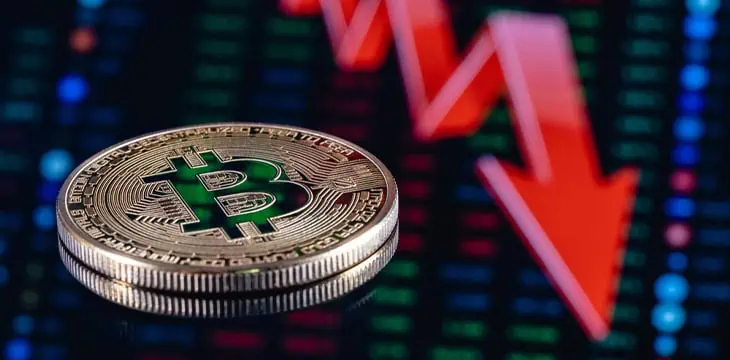|
Getting your Trinity Audio player ready...
|
The BTC token’s fiat price crash is wreaking havoc on miners whose entire business model was already suffering from the recent ‘halving’ reduction in block rewards.
The BTC token suffered another serious dip in fiat value last week, spurred by significant selling pressure from Germany’s government, the Mt. Gox liquidators wrapping up their decade-long recovery process, and news that the U.S. government was sending some of its significant BTC holdings to the Coinbase (NASDAQ: COIN) exchange for conversion to dollars.
Last week, Germany began moving around $300 million worth of the roughly $2.5 billion in BTC it seized from criminals (including the 50,000 tokens recovered in January from operators of a digital piracy portal). The German government sent the BTC in small batches to various exchanges, including Coinbase, Kraken, and Bitstamp. It moved another $900 million worth of the tokens on Monday, signaling that the sales won’t stop anytime soon.
Over the weekend, social media posts claimed that Germany’s government was also ‘buying the dip’ as BTC’s fiat value continued to fall. This post was based on blockchain data showing roughly $111 million in BTC flowing back from exchanges to government-controlled wallets.
However, this transfer actually represented tokens that the exchanges weren’t able to sell due to (a) the failure of the markets to meet the country’s reserve price, and (b) the apparent lack of fiat dollar liquidity on the exchanges (Germany isn’t interested in selling for dodgy stablecoins with unconfirmed fiat reserves). The same exchanges sent another $163 million back to Germany on Monday.
On July 4, German MP Joana Cotar made public a letter she sent to Chancellor Olaf Scholz and other leading pols pleading to halt these “not only not sensible, but counterproductive” sales. Cotar claimed that Germany should follow the (alleged) lead of the U.S. in holding BTC “as a strategic reserve currency.” (In reality, despite hopeful op-eds by ‘crypto bros,’ no one in the U.S. government is actually considering this.)
Cotar, a known BTC fan, proceeded to undermine her case by inviting Scholz and the others to a lecture by Samson Mow, former Blockstream executive and enthusiastic supporter of Tether, the Bitfinex exchange, and other dodgy endeavors. Sadly, other blockchain notables—like Sam Bankman-Fried and Changpeng ‘CZ’ Zhao—were, er, unavailable to offer their thoughts on why Germany would want to chain these fiscal anvils to its ankles.
In an effort to stop the BTC bleeding, Tron founder Justin Sun issued a tweet proclaiming his willingness “to negotiate with the German government to purchase all BTC off-market to minimize the impact on the market.” Skeptics were quick to point out that the self-aggrandizing Sun has made countless performative offers of this type before, including his alleged willingness to buy the Credit Suisse bank.
Sun’s interest in stopping BTC’s downward fiat spiral reminded some observers of Alameda Research CEO Caroline Ellison’s public offer to buy all of Binance’s FTT tokens (the in-house token of the FTX exchange). Ellison’s desperate offer followed the exposure of the fraud behind the FTX/Alameda empire and didn’t stop either entity from going belly-up within a week. Careful what you wish for, Justin.
All the cool governments are doing it
Germany isn’t alone in having a stash of BTC that may be dumped on the market in short order. The U.S. government has around 214,000 BTC in its possession, much of it also seized from ‘crypto’ crooks. But Uncle Sam’s ‘hodling’ days appear over, as it recently moved nearly 4,000 of these tokens—acquired from a former ‘vendor’ of the Silk Road darknet marketplace—to Coinbase.
Coinbase attempted to paint this as a deal to “provide custody and advanced trading services” to the Department of Justice’s Marshals Service. But it seems to be nothing more than Washington’s desire to ‘sell these pieces of crap before they fall any further.’ The tender for this ‘deal’ makes it plain that the Marshals Service “has a requirement for managing and disposing of large quantities of popular cryptocurrency assets.” (Emphasis added.)
The U.K. is sitting on $3.3 billion of its own BTC, again, much of which was seized from crypto criminals who imagined themselves impervious to such setbacks. While HM Revenue and Customs has conducted the odd auction of tokens in its possession, its long-term plans remain unknown.
All told, Arkham Intelligence estimates there is nearly $18 billion worth of BTC in government hands around the world. With many governments running significant deficits, the urge to sell now before BTC’s value tanks further may prove irresistible.
The government sales occurred just as Mt Gox customers learned that the failed exchange’s liquidators were finally ready to start distributing the BTC and BCH tokens reclaimed via the bankruptcy process. Billions of dollars worth of the 142,000 BTC tokens in Mt Gox’s hands began moving to designated exchanges on July 5 for distribution to customers. Having waited a decade, many of these customers will likely sell their tokens ASAP, putting more downward pressure on BTC.
Thiel says bloom off BTC’s rose
Crypto critics aren’t the only ones who believe BTC’s best days may be behind it. Speaking at the recent Aspen Ideas festival, tech billionaire Peter Thiel told CNBC’s Andrew Ross Sorkin that he was “not sure [BTC is] going to go up that dramatically from here.” Thiel said he still retains “a small position” in BTC, but “it’s going to be a volatile, bumpy ride” from here on in. He clearly preferred getting off this ride while the getting was still good.
Thiel said much of his original interest in BTC was based on its anti-government possibilities but he’s now “just much less convinced of that.” Thiel used the phrase “co-opted” to describe this year’s launch of government-approved BTC spot-based exchange traded funds (ETF).
Thiel said his original view of BTC as “a cypherpunk, crypto anarchist, libertarian, anti-centralized government thing” was a thread that had “somehow gotten lost.” Thiel related conversations he’d had with FBI officials who said “they’d much rather have criminals use [BTC] than $100 bills.” To Thiel, this suggests that “maybe it’s not quite working the way it’s supposed to.”
I-I-me-me-miner
There’s no question that BTC’s mantra of ‘decentralization’ has taken some serious hits in recent years, from MicroStrategy (NASDAQ: MSTR) CEO Michael Saylor acquiring over 1% of all circulating BTC tokens to the increasing dominance of certain mining pools.
This year has seen 54% of all BTC blocks mined by just two mining groups—Foundry USA (29%) and AntPool (25%)—while another 23% were mined by the third- and fourth-ranked pools. In other words, more than three-quarters of all BTC blocks can be traced back to just four mining groups. Such decentralization. Much wow.
That centralization will only increase on the news from one of those four miners that BTC’s recent fiat price decline has made all but six mining hardware units non-profitable. With a pressing need to replace existing mining units, along with the decline in block rewards miners can earn following this spring’s ‘halving,’ more and more miners will choose to call it a day—or ‘pivot to AI’ (artificial intelligence)—rather than continue to operate at a loss.
Your passport is revoked
There’s also growing public outrage at the sweetheart deals many miners have worked out with local governments, particularly in the state of Texas. About a year ago, Texans expressed outrage after the Electric Reliability Council of Texas (ERCOT) paid $31.7 million to Riot Platforms (NASDAQ: RIOT) to stop mining BTC during an August heatwave. One chamber of the state legislature approved a bill to rein in miners’ unfettered access to electricity, but the other chamber rejected this on ideological grounds and further expanded miners’ perks.
Other jurisdictions have grown less tolerant of miners’ freeloading, including Norway, where a push is on for “socially beneficial data centers” rather than mining operations that only benefit financial speculators. Next door, Sweden is exposing widespread tax evasion and misrepresentation of activities by “unscrupulous” mining operators.
Canadian provinces are becoming equally reluctant to welcome any additional mining operations while rising electricity costs in the country are forcing some miners to abandon unprofitable sites. In Venezuela, the government is taking more extreme measures, forcibly disconnecting mining rigs from the national power grid.
The growing disdain toward mining ops is on full display in a recent study examining ‘occupational prestige and occupational social value in the United Kingdom.’ The study, which examined how the average Brit feels about the value to society of a wide variety of professions, found that miners were less socially desirable than prostitutes. And that’s despite not a single documented case of mining rigs giving anyone the clap.
Desperate times call for desperate measures
Miners’ declining fortunes have led to some truly wacky proposals, including the idea of imposing a tax on individuals who ‘hodl’ their BTC tokens rather than, er, sell them for cash or trade them for other tokens (cuz you still can’t do anything useful with BTC). This argument is based on the idea that ‘nobody rides for free,’ which is kind of the argument put forth by taxpayers forced to pay miners not to mine, but never mind.
The truth is that BTC, having departed from Satoshi Nakamoto’s original concept of Bitcoin as peer-to-peer electronic cash in favor of utility-free ‘digital gold,’ has an economic model that simply doesn’t work. And it will never work, with or without harebrained plans to tax tokens that don’t participate in BTC’s pretend economy or the even more drastic step of lifting Bitcoin’s fixed 21-million token cap to ensure a more profitable block reward structure.
Satoshi’s plan was for his blockchain to scale to a point where transactions became so numerous that their fees could supplant miners’ reliance on block rewards. However, the BTC Core developers refused to allow Bitcoin to grow, resulting in the constrained (and ultimately useless) BTC token that the rest of the world often confuses with the original Bitcoin.
The prevailing (flawed) wisdom in the BTC camp is that the token’s price follows its hash rate—the theory that as more computational power is brought to bear, the token price increases in tandem. That’s not the experience on the BSV blockchain, the only network with a locked protocol that can trace its origins to Bitcoin’s Genesis block, which puts no limit on the amount of transactions any one block can hold.
By remaining true to Satoshi’s original plan, BSV offers an economic model that doesn’t defy reality. The number of transactions will continue to grow, offering an alternative revenue stream to supplement the block reward, leaving BSV miners in a better position to ensure the network’s security for the foreseeable future. (And with BSV’s focus on utility and network efficiency, mining becomes both environmentally-friendly and socially desirable.)
BTC Core remains philosophically opposed to expanding the blocks on their network despite ample evidence that this puts miners in an unsustainable position. Recanting this small-block adherence is effectively heresy, meaning the BTC Core camp will likely go down with this ship rather than admit they were wrong when they forked off Bitcoin into their small-block cul-de-sac.
It took the Catholic church 359 years to admit they were wrong for threatening to burn Galileo alive just because he had the balls to tell them that the sun didn’t revolve around the earth. If it takes BTC Core until 2376 to apologize, the only response will be: “BT-what?”
Watch: Teranode is the future of the Bitcoin network

 05-05-2025
05-05-2025 





